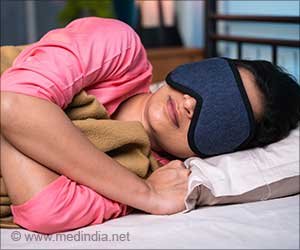Suffering from Memory Loss? Wear an Eye Mask

“Moving to the United Kingdom meant not being able to sleep for a simple reason: houses in Cardiff don’t have shutters!” said study author Viviana Greco, a Ph.D. candidate at Cardiff University Brain Research Imaging Centre and freelance associate editor at Researcher. “Most houses in the Cardiff area have only curtains and even blackout curtains are not enough to provide complete darkness.”
Greco and her colleagues carried out two trials to investigate how wearing an eye mask that blocks out ambient light while sleeping can affect cognitive performance. While previous research has demonstrated that eye masks help improve sleep in intensive care units, Greco and colleagues intended to investigate the effect of eye masks on ordinary sleep at home.
The initial study had a total of 89 individuals ranging in age from 18 to 35. The investigation lasted two weeks. Participants spent five nights sleeping in their homes while wearing an eye mask during the experimental week, followed by two days of assessment. During the control week, individuals slept at home without an eye mask for 5 nights and then had 2 days of testing.
The researchers discovered that wearing the eye mask improved the participants’ learning ability on a word-pair association task. They also responded more quickly on a psychomotor vigilance test, which assessed their behavioral alertness and sustained attention. This shows that the sleep mask improved episodic memory encoding and alertness.
Advertisement
A second investigation involved 33 people between the ages of 18 and 35 years old. This time, participants slept with an eye mask for two nights (experimental protocol) and two nights with an eye mask with cutouts such that no cloth covered the eye region (control procedure). Participants slept at home while wearing an EEG headband and a digital light meter on their pillows to analyze their sleep stages.
The findings mirrored the finding from experiment 1, in which participants performed better on the paired associative learning test after wearing the eye mask. Surprisingly, participant sleep diaries revealed no differences in sleep hours or self-rated sleep quality between the eye mask and control settings.
Yet, the findings revealed that improved learning performance after wearing the mask was connected with more slow-wave sleep time. Consequently, time spent in slow-wave sleep predicted memory benefits after mask use.
Slow-wave activity, according to the synaptic homeostasis hypothesis, restores the brain’s ability to encode new information by downscaling synapses that have been reinforced during the day. Since the researchers were unable to measure this, they believe the eye masks may have enhanced slow wave activity.
The study’s findings have real-world consequences, according to the authors, especially because many common jobs, like driving a car, require us to stay aware and respond quickly.
“Wearing an eye mask overnight can be an effective and inexpensive solution for improving and benefiting cognitive performance,” Greco told PsyPost. “Our results speak about improved reaction times and improved memory performance. The implications of our results are significant for many daytime tasks like driving a car or any educational or cultural context that requires learning.”
References :
- Wearing an eye mask during overnight sleep improves episodic learning and alertness – (https:pubmed.ncbi.nlm.nih.gov/36521010/)
Source: Medindia
Source link
#Suffering #Memory #Loss #Wear #Eye #Mask



